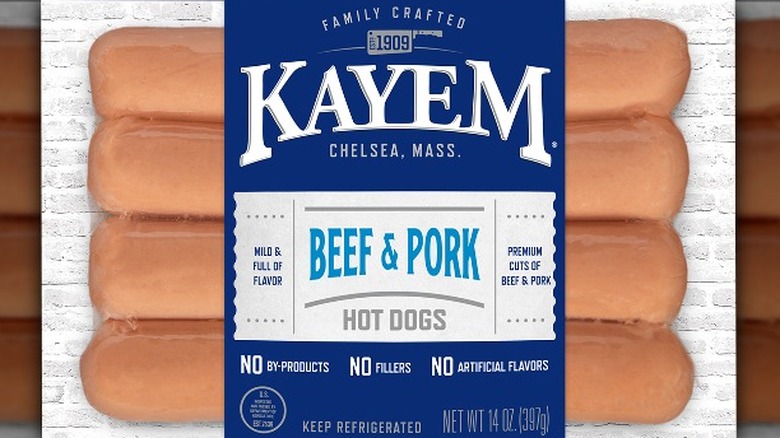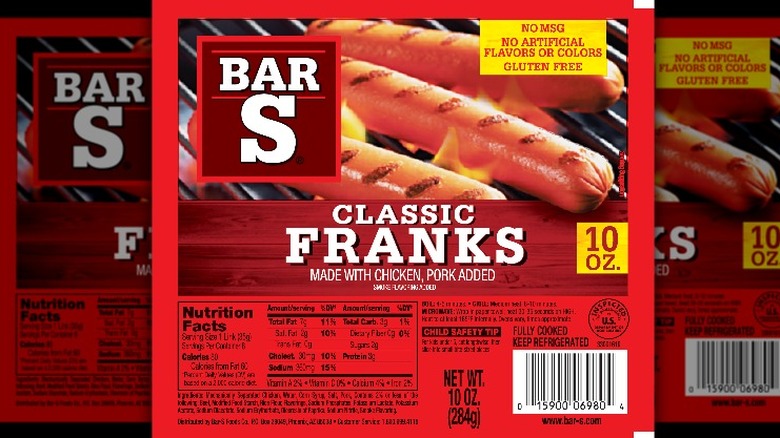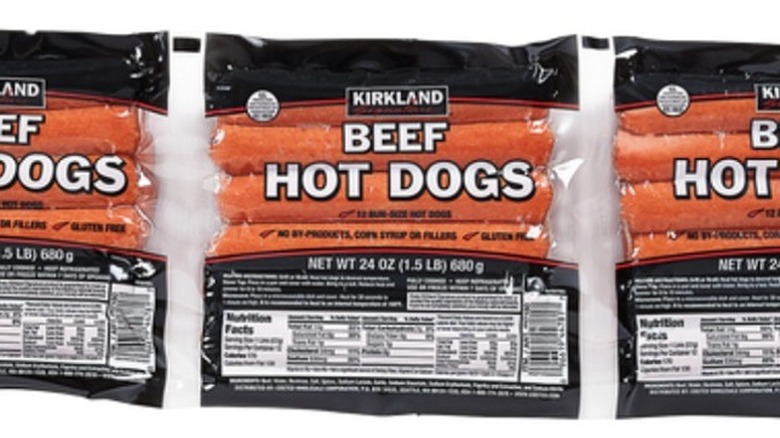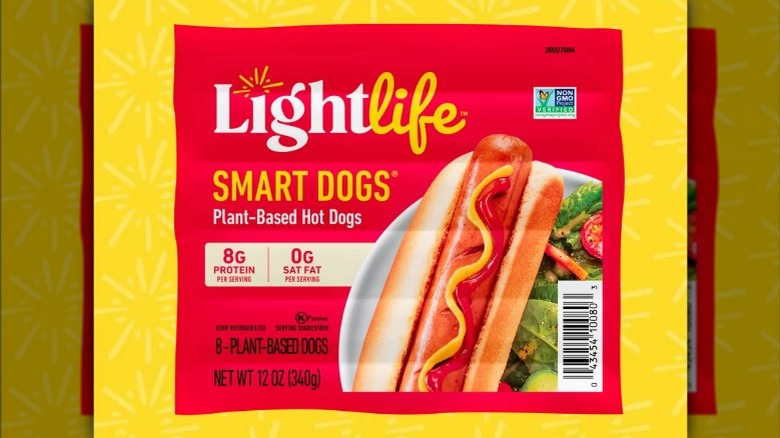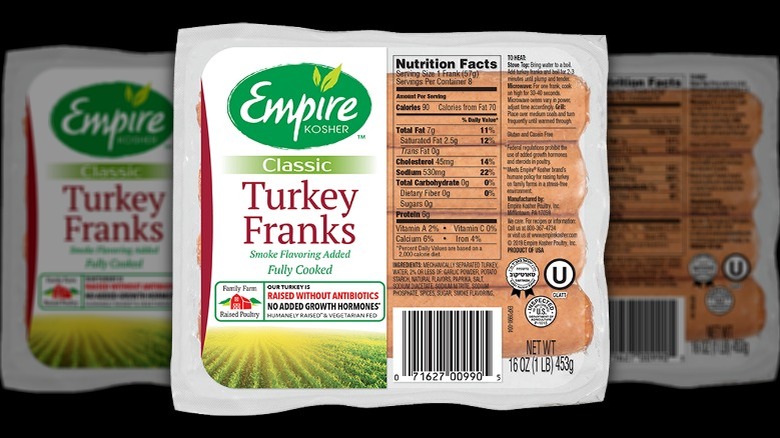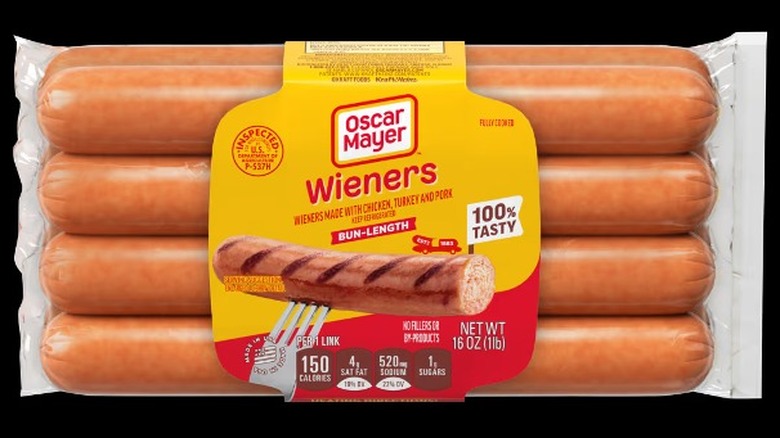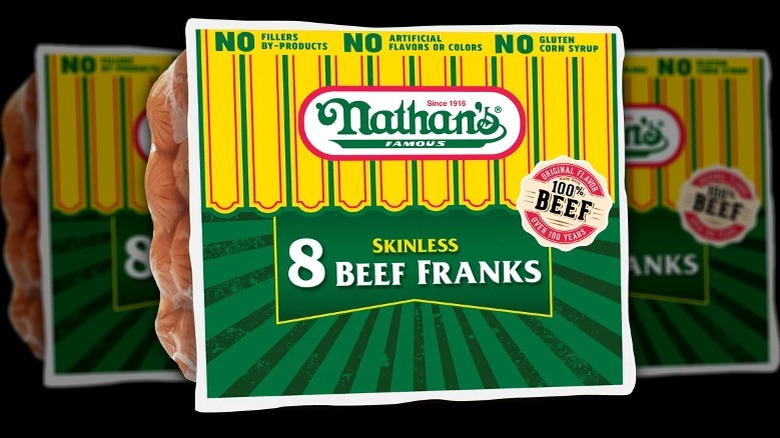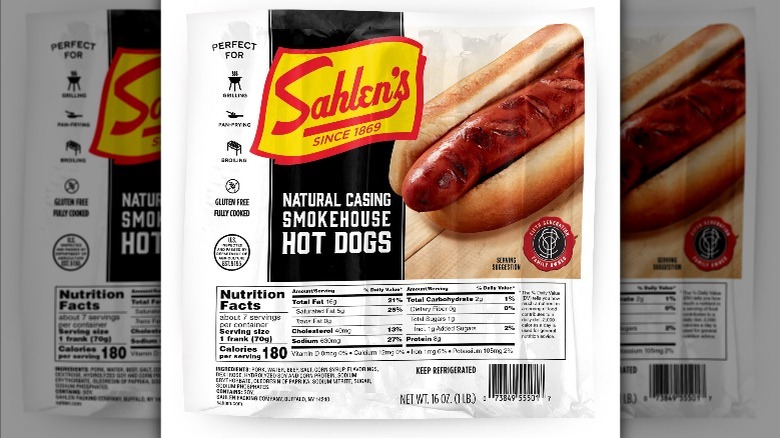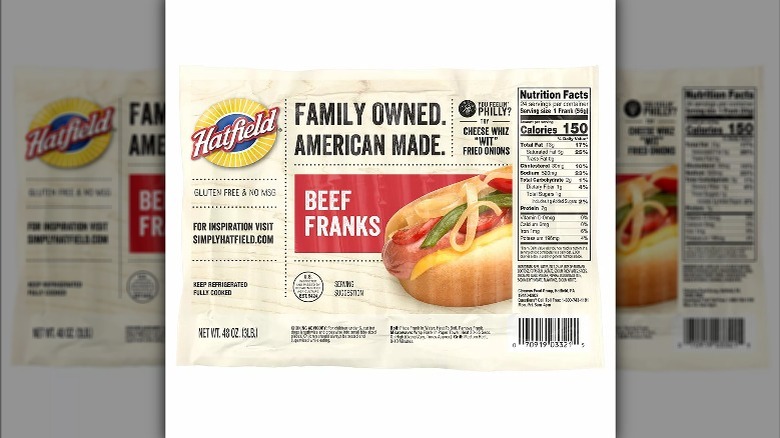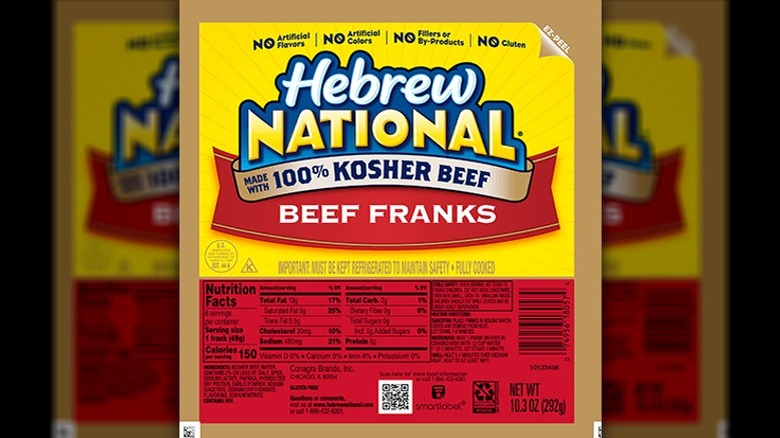13 Hot Dog Brands That Use Low-Quality Ingredients
Hot dogs are a widely popular, all-American food that many people love, but not all options on the market prioritize high-quality ingredients. As a processed food, it should not come as a huge shock that many hot dogs contain additives, preservatives, and other questionable components that can affect your health. Still, some hot dog brands are better than others. In this article, we'll dive into the factors that make certain hot dogs less ideal choices. These include the presence of mechanically separated meat, the use of fillers, additives, and preservatives, and particularly high levels of sodium, fat, and cholesterol. We'll also explore some of the health risks associated with added nitrates, which are commonly used as preservatives in hot dogs and other processed meats.
Surprisingly, some hot dogs out there may seem healthier at first glance, but their list of ingredients that tells another story. Labels that boast of being "natural" or "uncured" can easily mask a range of additives and high levels of sodium and fat, making them no better quality than their more processed counterparts. That's why it's always good to take a closer look beyond the marketing gimmicks to understand the true nutritional value and quality of these products before hitting the checkout lane.
Ball Park Prime Uncured Beef Franks
Ball Park Prime Uncured Beef Franks aren't all bad. They're made with 100% USDA prime beef and have no added nitrates, by-products, fillers, or artificial flavors or colors. However, take a quick peek at the ingredients list, and you'll see more than a few items that are far from natural – dextrose, potassium lactate, sodium phosphate, and sodium diacetate, just to name a few. These ingredients are used for flavor, preservation, and texture, but it's hard not to notice that these hot dogs are not nearly as minimally processed as the label might lead you to believe.
What makes these hot dogs "uncured" is the absence of synthetic nitrites and nitrates, which are commonly used preservatives in traditional hot dogs. Instead, uncured hot dogs like these use natural sources of nitrites, such as celery powder. Here's the main issue with nitrites: studies have linked them to an increased risk of certain cancers and type 2 diabetes. This risk exists whether the nitrites are synthetic or naturally derived. On top of all that, each single Ball Park Prime Uncured Beef Frank contains 230 calories and 20 grams of fat, nine of which are saturated fat. One hot dog also has 45 milligrams of cholesterol and a whopping 710 milligrams of sodium. All in all, the USDA prime beef and the absence of certain additives don't really make up for many other sub-par ingredients in these franks.
Kayem Beef & Pork Hot Dogs
Kayem Beef & Pork Hot Dogs became the official Fenway Frank in 2009, a testament to their widespread popularity and tastiness. However, when it comes to the quality of ingredients, these hot dogs don't fare quite so well. First of all, they contain not one but two types of added sugar: corn syrup and dextrose. The ingredient list also includes several additives, including potassium lactate, sodium diacetate, and sodium nitrite. Excessive consumption of the preservative sodium nitrite can specifically elevate the risk of a few types of cancers and type 2 diabetes. On top of that, the long-term effects of other additives are not fully understood and may lead to health risks down the road.
That means regularly eating overly processed foods — like ahem, Kayem Beef & Pork Hot Dogs — is probably not ideal. These additives, combined with the substantial amount of saturated fat and sodium present in each serving (5 grams of saturated fat and 430 milligrams of sodium), raise concerns about the overall quality of Kayem Beef & Pork Hot Dogs. Though Red Sox fans may love them dearly, their ingredient profile points to a product that is heavily processed and not the healthiest option out there.
Gwaltney Original Chicken Hot Dogs
Gwaltney Original Chicken Hot Dogs might sound like a healthier choice compared to their beef or pork counterparts, but they come with their own set of concerns. While they are healthier in some ways, like being lower in calories and saturated fat — 90 calories and just 2 grams of saturated fat per hot dog — the quality of their ingredients raises some red flags. The primary ingredient here is mechanically separated chicken, which is made by forcing chicken through a sieve to separate the meat from bones, skin, and connective tissue. This process often includes a lot of fat and tissue, which can make the final product far less nutritious and more processed. The result is a texture that's more like a paste, which is common in heavily processed meat products.
Unfortunately, that's not all. These hot dogs are packed with corn syrup and a variety of fillers, including mention sodium nitrite, a common preservative that has been linked to potential health risks, including increased cancer risk and type 2 diabetes. While you might feel like you're being health-conscious by choosing chicken hot dogs, Gwaltney Original Chicken Hot Dogs are not as healthy as you'd hope.
Bar-s Classic Franks
The quality of Bar-s Classic Franks is definitely worth scrutinizing, starting with the list of ingredients. The label of these franks proudly advertises them as having no MSG or artificial flavors or colors, but omitting these few ingredients does not make a healthy hot dog. First of all, Bar-s Classic Franks use mechanically separated chicken, which is made by pushing chicken through a screening device. This process doesn't just get the meat — it also includes fat, skin, and connective tissue. The result is that mechanically separated chicken is far less healthy than ground poultry, which is made from whole muscle parts or deboned meat.
The ingredient list also includes various fillers and additives, such as corn syrup and dextrose, which are types of processed sugars, along with modified corn starch and sodium nitrite. While sodium nitrite is a common preservative, it has been linked to potential health risks such as increased cancer risk and type 2 diabetes. The list goes on with sodium phosphates, potassium lactate, and sodium diacetate, adding to the overall processed nature of the product. They are tasty and convenient, but their ingredients suggest they are far from wholesome.
Kirkland Beef Hot Dogs
Costco's Kirkland Beef Hot Dogs are a favorite among many for their quality-to-value ratio. They have a few positive things going for them — they don't contain any by-products, corn syrup, or fillers. Very few of the most popular hot dog brands out there can say that. While they avoid some of these questionable ingredients, they still have their drawbacks. The ingredients list on the package of Kirkland Beef Hot Dogs shows dextrose, a corn-derived sweetener, and sodium nitrite, a common preservative linked to potential health risks like cancer and type 2 diabetes. As far as nutrition goes, these ingredients detract from the quality department.
On top of that, Kirkland Beef Hot Dogs are notably high in fat, saturated fat, and sodium, which can be concerning if consumed in large amounts. Specifically, each hot dog has 14 total grams of fat, which include 6 grams of saturated fat and 1 gram of trans fat. For reference, that's 22% of the daily recommendation for fat and 30% for saturated fat — all in a single hot dog. They're also notably high in sodium at 530 milligrams per serving, or 22% of the daily recommended value. This is all to say that while the price of Kirkland Beef Hot Dogs is always good, the ingredients in these franks don't exactly hit the mark for quality.
Lightlife Smart Dogs
Lightlife Smart Dogs are plant-based hot dogs, which may give the false impression that they're far healthier than traditional hot dogs. As it turns out, their lack of meat isn't doing them any favors as far as quality ingredients go. These hot dogs are packed to the brim with processed components. The base includes soy protein isolate, a highly processed form of soy. To enhance flavor and texture, Lightlife uses a variety of other processed ingredients like soybean oil, canola oil, and tapioca starch, which can contribute to inflammation and offer minimal health benefits compared to whole, less processed alternatives.
These meat-free hot dogs also contain two different sweeteners, raw cane sugar and hardwood smoked sugar. Other additives include xanthan gum, guar gum, and carrageenan, many of which can also cause inflammation and other digestive issues. The list of additives goes on, featuring glutamic acid and pea protein. At the end of the day, if you're trying to find a hot dog with higher-quality ingredients and looking to vegetarian franks for the solution, Lightlife Smart Dogs are probably not it.
Empire Uncured Turkey Franks
Empire Uncured Turkey Franks boast on the label that the turkeys used are free from antibiotics and growth hormones. Let's be clear about something right away: this claim is somewhat misleading. Growth hormones are banned in U.S. poultry altogether, so no poultry-based hot dogs include them. While we're on the topic of poultry, let's get even deeper into the quality of Empire Uncured Turkey Franks: the brand uses mechanically separated turkey. This means it is a blend that includes not just meat but also skin and connective tissue, which creates a product that is certainly not the whole, lean turkey you might expect.
It doesn't go uphill from here as far as ingredients go. Empire Uncured Turkey Franks contain several additives, including sodium nitrite, a preservative commonly linked to potential health risks like increased risk of type 2 diabetes and certain cancers. Nutritionally, Empire Uncured Turkey Franks are also nothing to write home about, with each hot dog providing 190 calories, 10 grams of fat, and 660 milligrams of sodium. While they may not be the worst option on the market, the combination of additives and less-than-optimal nutritional content means they're not the healthiest choice either.
Oscar Mayer Wieners
Oscar Mayer Wieners are the hot dogs that made Oscar Mayer famous, in part thanks to the catchy 1963 wiener jingle that many people can still sing along with today: "Oh, I'd love to be an Oscar Mayer Wiener!" However, no amount of fame can erase the fact that these franks contain a bunch of ingredients of subpar quality. The first two ingredients listed on the label are mechanically separated chicken and turkey, which means you're not just eating the good parts of the poultry. Being mechanically separated means there's connective tissue and skin mixed together in a paste with the meat. Aside from that, there's also the laundry list of additives, including dextrose, potassium lactate, sodium nitrite, and corn syrup. Despite the brand's promise of no fillers or by-products, this heavy reliance on additives and sweeteners means these hot dogs are more processed than many might prefer.
From a nutrition standpoint, Oscar Mayer Wieners aren't the worst you'll find on grocery store shelves, but they aren't the pinnacle of health in a hot dog, either. Each serving of one wiener has 12 grams of fat, 5 grams of saturated fat, 30 milligrams of cholesterol, and 380 milligrams of sodium. If you're after a hot dog that will bring some nostalgia, Oscar Mayer Wieners could easily be the way to go. However, if you're more interested in a high-quality frank, you better look elsewhere.
Dietz & Watson Deli Beef Franks
Dietz & Watson Deli Beef Franks might toot its own horn about using nothing but the highest quality ingredients, but the ingredients list of these hot dogs has a different tale to tell. The producer doesn't use high fructose corn syrup or MSG, but its hot dogs are far from clean. The gap between its promises and the actual ingredients suggests that quality may be more about marketing than substance. The ingredient list reveals several additives, including sodium phosphate, sodium erythorbate, and sodium nitrite, the latter of which is a common preservative linked to health risks like cancer and type 2 diabetes. The list also includes the mysterious "flavoring" — leaving it very uncertain what's in there. To be clear, it's not even "natural flavoring," which would at least be slightly better.
These hot dogs are not exactly a health win. Each serving packs 11 grams of total fat and 4 grams of saturated fat. On top of that, you'll find 25 milligrams of cholesterol and 420 milligrams of sodium per serving. These numbers are high, and consuming a lot of saturated fat, sodium, and cholesterol can contribute to many health issues. In the end, it seems Dietz & Watson's promises of premium products don't quite measure up where its Deli Beef Franks are concerned.
Nathan's Famous Skinless Beef Franks
Way back in 1916, Polish immigrant Nathan Handwerker started up a hot dog stand in Coney Island. Today, Nathan's Famous is an internationally-renowned brand. Without a doubt, part of this has to do with the fact that these hot dogs are always made with 100% beef, no fillers or by-products, no artificial flavors or color, and no corn syrup. That's a good start to a sausage with high-quality ingredients, but the problem is, they drop off a bit from there because of the long list of additives.
Sorbitol is one of the additives, and it is known to cause digestive issues if consumed in excess. Sodium nitrite, a common preservative, is linked to an increased risk of cancer and type 2 diabetes. Hydrolyzed corn protein may cause allergic reactions and inflammation. Together, these ingredients highlight the processed nature of Nathan's Famous hot dogs. No hot dog is going to be all that good for you when it comes down to it (it is a hot dog after all), but it'd be nice if Nathan's Famous could figure out a way to make a hot dog with far fewer additives.
Sahlen's Natural Casing Smokehouse Hot Dogs
Sahlen's Smokehouse Hot Dogs are among the priciest on this list, but that doesn't mean the quality of ingredients is also high. Just like the majority of the hot dogs we list here, they are full of additives and fillers. First of all, they contain two types of sweeteners: corn syrup and dextrose. They also contain some mysterious "flavorings," leaving consumers in the dark about what they're actually eating. Other additives include hydrolyzed soy and corn protein, sodium erythorbate, sodium phosphate, and sodium nitrite. Sodium nitrite can lead to an increased risk of cancer and type 2 diabetes.
Sahlen's Smokehouse Hot Dogs don't shine from a nutritional perspective either. Each serving contains 15 grams of fat, including 5 grams of saturated fat, and a hefty 630 milligrams of sodium. High levels of saturated fat and sodium can contribute to cardiovascular issues if consumed frequently. Overall, despite their premium price, Sahlen's Smokehouse Hot Dogs fall short in delivering a healthier or higher-quality product.
Hatfield Beef Franks
Hatfield Beef Franks are described as a farm-to-table product on the company website, but the ingredients list on the package begs to differ. The franks are free of MSG, but they are also packed with multiple sweeteners and additives. That's not exactly what we think of when we hear "farm to table," is it? For example, Hatfield Beef Franks include three sweeteners in total: corn syrup, sugar, and dextrose. There are quite a few additives, too, including sodium phosphate, sodium erythorbate, and sodium nitrite. Sodium nitrite is particularly concerning, as it has been linked to increased risks of cancer and type 2 diabetes.
What's more, each hot dog contains 15 grams of total fat, 7 grams of saturated fat, 30 milligrams of cholesterol, and 520 milligrams of sodium. These levels are noticeably high, and consuming too much saturated fat, cholesterol, and sodium can lead to cardiovascular issues. While Hatfield Beef Franks are no doubt delicious, the reality is that their heavy use of sweeteners and additives, not to mention their poor health profile, make them a less-than-ideal choice of hot dog if you're going for top-notch quality.
Hebrew National Beef Franks
Hebrew National Beef Franks are famous for being kosher, meaning they adhere to specific Jewish dietary laws. Kosher standards dictate not only which foods can be eaten but also how they must be prepared and processed, ensuring a level of cleanliness, quality, and ethical treatment that often suggests higher overall food quality. However, despite their kosher status, these hot dogs are loaded with numerous additives that compromise their quality. The ingredient list reveals lots and lots of highly processed additives, including sodium lactate, hydrolyzed soy protein, sodium diacetate, sodium erythorbate, and the ever-ambiguous "flavoring." The inclusion of sodium nitrite is especially troubling, as it has been connected to certain cancers and type 2 diabetes.
The reality is that Hebrew National Beef Franks rely on a multitude of additives and preservatives. These ingredients detract from the overall quality and healthiness of the product, making it a less desirable choice for anyone prioritizing truly high-quality hot dogs.
How we chose the hot dogs on this list
When putting together this list, we zoomed in on the ingredient quality of each hot dog. Ideally, a great hot dog should be made with mostly pure beef, pork, or chicken (unless it's vegetarian) and have as few additives, sweeteners, and preservatives as possible. Unfortunately, many of the hot dogs on this list do not use pure meat options. Instead, they use heavily processed ingredients, like mechanically separated meats that include parts like skin and connective tissues, which aren't the most appetizing or healthy.
We also took a close look at the types of additives used. Sodium nitrite, a common preservative found in many of these hot dogs, has been linked to serious health risks such as cancer and type 2 diabetes. A better hot dog would avoid these kinds of chemicals, choosing natural preservatives or skipping them entirely. Added sugars and sweeteners, like corn syrup, sugar, and dextrose, were another red flag. These ingredients not only make the hot dogs less healthy but also contribute to issues like obesity and diabetes. Finally, we checked the nutritional content, focusing mostly on saturated fat, cholesterol, and sodium. A top-tier hot dog should provide a good balance of protein and healthy fats without overloading you with harmful components. Keeping these factors in mind, we point out the hot dogs that don't quite make the grade for high-quality ingredients, so you can make smarter choices while browsing the grocery store aisles.


